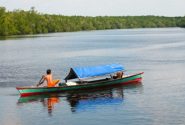
Trade treaties may be one tool for addressing illegal logging, but they are no substitute for effective forest-management policy in exporting countries, says Pablo Pacheco, a scientist with the Center for International Forestry Research
SAN JOSE, Costa Rica (30 July, 2013) – A free trade agreement signed by Peru and the United States shows that the same treaties that open global markets to tropical timber can provide tools to stem illegal logging, according to a study under way in Peru.
With provisions for stiffer sanctions, stronger law enforcement and cooperation to improve forest management, the pact reflects exporting and importing countries’ shared responsibility in fighting illegal logging, Julia Urrunaga, a researcher with the non-profit Environmental Investigation Agency, said at the Third Latin American Congress of the International Union of Forestry Research Organizations (IUFRO) in San José, Costa Rica.
“For the environmental provisions in free trade agreements to be effective, they have to be binding, subject to dispute resolution and placed on an equal footing with the commitments in other chapters,” said Urrunaga, the leading author of a report on ways in which illegal loggers in Peru “launder” timber, especially mahogany, to make it appear to have been cut legally in government-licensed timber concessions.
Although the Peru trade agreement is unusual because of its very specific language about illegal logging, Urrunaga said the Trans-Pacific Partnership currently being negotiated among 12 countries on both sides of the Pacific Ocean might also include provisions to prohibit the illegal harvest and trade in timber and forest products.
The draft text of that treaty has not been released, but negotiations include environmental and conservation issues, according to the U.S. Trade Representative’s office.
Trade treaties may be one tool for addressing illegal logging, but they are no substitute for effective forest-management policy in exporting countries, according to Pablo Pacheco, a scientist with the Center for International Forestry Research (CIFOR) who led a panel discussion about the local and regional timber trade in Amazonian countries at the IUFRO congress.
“Demand-side measures to ensure the legality of exports do not necessarily mean that forest management will be sustainable in the long run,” Pacheco said. “It is important to put in place measures on the supply side to promote sustainable practices.”
Illegally harvested timber is sold within Amazonian countries and across borders into neighboring countries, as well as internationally, researchers at the IUFRO congress said. Yet, it is hard to separate illegal from legal timber.
As much as half the timber harvested in Brazil could be of “unknown origin,” according to André Luiz Campos de Andrade, executive manager of economy and markets for the Brazilian Forest Service.
Forestry laws in most Latin American countries, in their attempts at promoting local forest management, have been inspired on large-scale timber production, and do not necessarily respond to the interests and needs of smallholders who cut and sell trees when they need cash, Pacheco said.
Nonetheless, they often must bear the cost of hiring a chainsaw operator and transporting the timber to market.
“Compliance with regulations means additional costs and institutional barriers that tend to limit their competitiveness and encourage illegality,” Pacheco said. “Forestry regulations aren’t adapted to the different situations that exist.”
Instead of responding with “command and control” measures that punish small-scale illegal logging, he said, governments should tailor regulations to different conditions and help smallholders obtain credit and technical assistance for managing their forests as part of broader strategies of farm management.
For more information on the topics discussed in this article, please contact Pablo Pacheco at p.pacheco@cgiar.org
This work forms part of the CGIAR Research Program on Forests, Trees and Agroforestry and is supported by the European Union in the context of the PROFORMAL Project.
We want you to share Forests News content, which is licensed under Creative Commons Attribution-NonCommercial-ShareAlike 4.0 International (CC BY-NC-SA 4.0). This means you are free to redistribute our material for non-commercial purposes. All we ask is that you give Forests News appropriate credit and link to the original Forests News content, indicate if changes were made, and distribute your contributions under the same Creative Commons license. You must notify Forests News if you repost, reprint or reuse our materials by contacting forestsnews@cifor-icraf.org.












